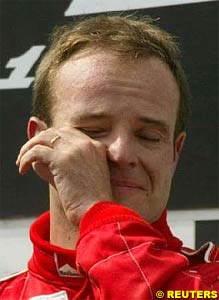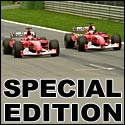
Atlas F1 GP Correspondent
Last Sunday, the Ferrari team left the fans and members of the press shocked with their decision to impose team orders and ask Rubens Barrichello to let Michael Schumacher win the Austrian Grand Prix. Atlas F1's Will Gray was in the Austrian media centre when the press and the crowd erupted. This is the story
The Italian Scuderia's calculated game of chess at the A1-Ring left Grand Prix purists in fury and created an immediate and incredible hatred of the once great marque. Even the local priest in Ferrari's Maranello home was left praying for team boss Jean Todt's forgiveness.
The first sign, picked up by an eagle-eyed F1-Digital camera crew and repeated in slow motion, was a note, passed along the pit wall from Ferrari team boss Jean Todt to technical director Ross Brawn and described as "a weather report" in a post-race press conference. "Storm clouds ahead?" one quick-witted journalist quizzed later after the Englishman's bizarre explanation of the incident.
The note triggered heads of the busily-typing journalists to rise towards the banks of televisions displaying the whole farcical event in precise detail. Still many continued, in defiance, polishing off introductions.
'Brazilian Rubens Barrichello secured the second victory of his 153-race career at the A1-Ring on Sunday after outpacing his Ferrari teammate World Champion Michael Schumacher in a crash-marred Austrian Grand Prix.' Such was the conviction that Ferrari would not do the unthinkable.
But, in an instant, the air in the hot and feverish media centre was sharply drawn in by disbelieving journalists as jaws dropped and the headlines turned from 'Rampant Rubens' to 'Schu must be joking! Rubens is robbed'. The response was astonishing.
From concentrated silence, the media centre erupted. Angry exchanges were held with inanimate televisions as journalists swore in disbelief that Ferrari could do such a thing to their sport. The immediate reaction was, for most people, one of disgust and of anger directed at both Ferrari and German Schumacher, even if the latter reflection was more controlled.
Boos erupted as many astonished journalists thrust themselves to the front of the long and narrow desk-filled room, where the two scarlet-clad drivers sheepishly made their entrance for the post-race press conference. Both frowned. Both looked at the floor. Both were already conscious that their team's decision had, perhaps, been a gigantic PR blunder.
Schumacher, continuing an apparent mini personal protest that had seen him push Barrichello onto the top step of the podium, offered his teammate the centre chair in the media arena. He took it, sat down, and immediately responded to the derision of the hissing pack that faced him.
"I feel sorry that you guys are doing that," he said, offering his opinion on the strong response to their entrance. The calm and likeable Brazilian, like most others in the room, had never seen or heard anything like it. And, hopefully, we will never see it again.
Then began the aggressive and heavily loaded questioning, mostly directed at Schumacher. "Given your strong position in the team, couldn't you have disobeyed the team order?" came the first 'from the floor' inquiry for Schumacher. "As a gentleman and a sportsman, how do you find the decision?" followed a rare one directed to third-placed Williams-BMW driver Juan Pablo Montoya. Both received cautious answers.
Not so the barrage from an angered British journalist, who cried: "Michael, what is this Championship worth now? Isn't this a sport? Isn't this about motor racing?" Such direct questioning summed up the mood of most of the room, and, it soon appeared, most of the paddock. But all remained unanswered.
As his drivers fended off continued questioning, Ferrari team chief Jean Todt, the man who, by all accounts, made the controversial decision, snuck in a side door to take a look at the furore that the move had created. The journalists' boos had been heard in the garages below the media centre and the Frenchman was keen to make sure his son-like Schumacher and 'the other driver' Barrichello were handling the pressure. Just one minute told him they were in control, and, as silently as he had crept in, he skulked out again and prepared to meet the media on home ground, in the Ferrari motorhome.
Schumacher and Barrichello eventually brought the press conference to a close, by demanding no more questions. The final two, one from the aforementioned Briton who asked Schumacher if he wanted to win the World Championship "because you are the best racer or because you have got the best contract" and the other from a German journalist who pointed out: "All three of you are talking about this as a team sport. Why do we have an individual World Championship for drivers?"
Neither gained a verbal response as Schumacher and Barrichello replied with their feet by walking out. But third-placed Montoya, according to reports, personally responded to the journalist who asked the final question by simply saying "good point". That, of course, was off the microphone.
As Schumacher and Barrichello faced the barracking inside the media centre, their own fans, and those of Ferrari, were reacting angrily around the normally serene circuit in the sun-baked Styrian Alps. Those storm clouds, predicted earlier, were on their way.
Fans were seen burning Ferrari flags as the supporters' enthusiasm was turned into disgust and team shirts were stripped off and discarded. "I am going to go and buy a BMW or a Mercedes hat now," declared one previous Ferrari devotee from Germany as he thrust his scarlet apparel onto the ground.
The red storm of fury bubbled on in the aftermath of the controversy as paddock patter turned to heated debate over the rights and wrongs of the matter. From team bosses to security guards to motorhome staff, everyone put their own view across. Ferrari went on the defensive.
"I actually agree with the decision," said one of the sponsors of the controversy-hit team as the journalist who earlier asked if there was validity in a Drivers' World Championship sent a barrage of abuse in Ferrari's direction. "Most of the mechanics seem just happy to have seen Ferrari take a one-two finish," he continued.
The over-riding view up and down the pitlane, however, was that Ferrari had harmed the sport by what they did. Williams-BMW bosses Patrick Head and Gerhard Berger strongly criticised their rivals while canny team boss Frank Williams remained silent on the matter. They, you see, have undertaken such moves before.
So too have McLaren, as recently as 1998, when David Coulthard moved over for teammate Mika Hakkinen at the season-opening Australian Grand Prix, although there may be debate that it was Scot Coulthard's decision to do so. And so the anger began to subside. Emotions were dumbed down by reason.
Todt, Brawn, Luca di Montezemolo, whoever made the call could not have imagined the response it would bring, but it was clearly a mathematical decision not an emotional one. To win the Drivers' and Constructors' Championship as quickly as possible, a one-two with Schumacher at the head was clearly the best solution.
In the morning after, as the sport's governing body - the FIA - issued a personal invite to Messers Schumacher, Barrichello et al for a little gathering in Paris on June 26, to allow them to explain just what they had done, seasoned observers began to change their tune. The red mist had cleared. There have always been team orders and there always will be. The debate, like the memories, will continue forever.
The day that Ferrari shocked Formula One was one that will last forever in the memories of every fan of the sport.
 The roar of the engines in the Italian Scuderia's cars was drowned out by the jeers of the crowd as Brazilian Rubens Barrichello backed off and Schumacher cruised past. And, as a journalist working in the A1-Ring media centre, witnessing the response was incredible.
The roar of the engines in the Italian Scuderia's cars was drowned out by the jeers of the crowd as Brazilian Rubens Barrichello backed off and Schumacher cruised past. And, as a journalist working in the A1-Ring media centre, witnessing the response was incredible.
Please Contact Us for permission to republish this or any other material from Atlas F1.
